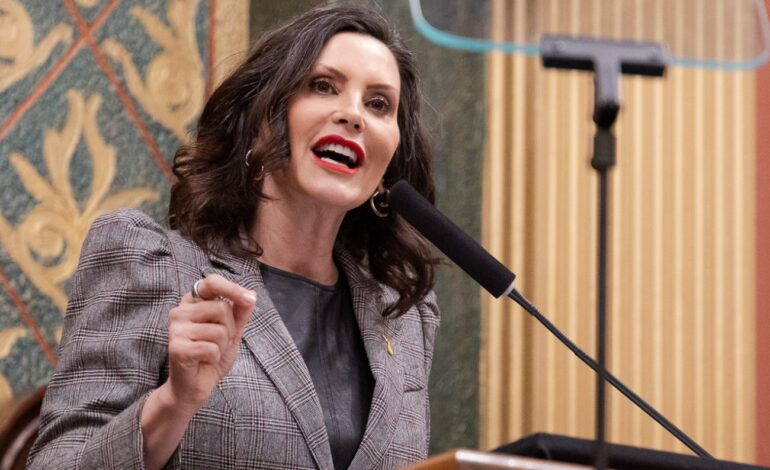LANSING – Governor Whitmer delivered her seventh annual State of the State address at the Capitol in Lansing, addressing key successes and challenges in Michigan. She emphasized political division, economic uncertainty and her vision for the state’s development in 2024.
Despite battling a cold, Whitmer outlined plans for economic growth, infrastructure improvements, job creation and enhancements in education and healthcare. She called for bipartisan cooperation to find sustainable and fair solutions to what she famously called “those damn roads” — a slogan from her 2018 campaign.
She began her 56-minute speech by announcing the renaming of the Michigan Constitution Hall in honor of former U.S. Senator Debbie Stabenow, recognizing her long service and status as the first woman elected to represent Michigan in the Senate.
Key achievements
Whitmer, whose second and final term ends in 2026, highlighted Michigan’s progress in various sectors, from scientific research and higher education to healthcare and energy. She praised her administration for boosting the state’s national and global standing, crediting key officials, including Lt. Governor Garlin Gilchrist, Secretary of State Jocelyn Benson and Attorney General Dana Nessel.
Among the achievements:
- Education and Research: Michigan Tech University was ranked among the top 150 research universities worldwide, joining U of M, MSU and Wayne State.
- Healthcare: Expansion of RxKids, a pioneering program supporting infants and new mothers, and the launch of the Joan Secchia Children’s Rehabilitation Hospital in Grand Rapids.
- Clean Energy and Jobs: Plans to reopen the Palisades Nuclear Plant, making it the first nuclear plant in U.S. history to be restarted, securing 600 union jobs and clean energy for thousands.
- Detroit Revitalization: The reopening of Michigan Central Station, hosting the NFL Draft, and the city’s first population growth in 67 years.
- Infrastructure: Near completion of the Gordie Howe International Bridge, set to serve 25,000 vehicles daily between Michigan and Canada.
On the economy, Whitmer noted Michigan’s $2.7 billion budget surplus and highlighted a 35 percent GDP growth since 2019. She also celebrated 40,000 new auto industry jobs and an increase in the state’s median household income by $16,000 to $77,000 annually.
Challenges and policy priorities for 2025
Despite progress, Whitmer acknowledged rising inflation, high interest rates and political division as major hurdles. She pointed to rising housing costs, noting a 50 percent increase in home prices over the past four years and a shortage of 140,000 homes. She proposed a $2 billion investment to build or renovate 11,000 homes, creating 10,000 construction jobs.
Other key policies include:
- Minimum Wage Increase: Raising the minimum wage to $15/hour by 2027.
- Energy Assistance: Expanding support for 335,000 low-income families struggling with energy costs.
- Tax Relief: Cutting taxes for seniors and working-class families, increasing the Earned Income Tax Credit five-fold.
- Education: Strengthening tuition-free college programs like Michigan Reconnect and the Michigan Achievement Grant, benefiting more than 250,000 students.
“Those Damn Roads” – A call for sustainable solutions
Whitmer admitted that her previous road repair plans provided temporary fixes, despite $3.5 billion in infrastructure investments since 2020. She urged bipartisan support for a long-term, fair revenue solution, arguing that cutting funds from public safety, healthcare or schools was not an option.
She called on state leaders to return to negotiations to find a permanent fix for Michigan’s roads, emphasizing that compromise is necessary.
Final message: A strong Michigan, but more work to do
Whitmer closed with a direct message to Michiganders, reaffirming her commitment despite national political changes. She stressed that Michigan represents America’s economic, political and social diversity, and urged unity in tackling key issues.
She warned that Trump’s proposed 25 percent tariffs on Canadian imports could cripple Michigan’s economy, raising costs by $1,200 per family and jeopardizing jobs in auto manufacturing, small businesses and construction.
Looking ahead, Whitmer vowed to continue bipartisan efforts to cut costs, create jobs and make real improvements in people’s lives.
“Michiganders are tired of political games,” she said. “Let’s lead by example and show the rest of the country how things get done.”






Leave a Reply